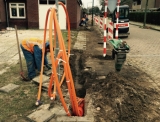
NBN chief executive Bill Morrow has copped a barrage of criticism from the Information Technology Professionals Association, with his recent statements on the network being described as "absurd" and "stupendously ignorant and arrogant".
ITPA president Robert Hudson said Morrow had first claimed Australians would take up fast connections even if given free, then added to the confusion by claiming that there were no 1Gbps plans on offer from retailers.
Morrow made the first statement while releasing the NBN Co's half-year results on 10 February.
The NBN head then contradicted himself, Hudson claimed, by saying NBN Co doesn’t promote 1Gbps services because it is more important to get 25/50Mbps to everyone as this is what "the bulk of customers are opting for”, a claim that was repudiated by the retail service provider MyRepublic.
{loadposition sam08}"Perhaps most alarmingly, Morrow has also compounded all this confusion by claiming it is not economically viable to deliver fibre to the home in the first place," Hudson said.
"In response, firstly, when I conducted a survey of ITPA members over the last few days, 96% of respondents indicated they would be willing to pay more money for faster Internet speeds (nominally over 100Mbps).
"Sure, they are digitally literate IT workers with a need for speed but they are also the people who are most likely to be aware of the potential for economic benefit that comes from the combination of digital technology and high speed broadband."
Hudson pointed out that the biggest issue in offering affordable high-speed connections to customers was the cost that RSPs paid to offer NBN services to their customers.
"Currently RSPs pay an Access Virtual Circuit (AVC) charge for each customer they connect to the network. They also pay a one-off charge to connect to each of the 121 nation-wide Points of Interconnect (POI) in addition to their own backhaul costs from each POI back to their networks. Further, there is also a Connectivity Virtual Circuit (CVC) charge for bandwidth between the NBN and their own networks, which is calculated on a per Mbps per month basis," he said.
"The CVC price structure has actively discouraged ISPs from selling higher-speed connections. Rather than nobody buying fast connections because they are unwanted (as suggested by Morrow), the reality is that fast connections aren't popular because they're too expensive."
Hudson said the NBN Co had finally acknowledged these issues by proposing a tiered CVC charging scheme based on industry-wide calculations last year. More recently, the company had agreed to offer tiered CVC pricing on a per-RSP basis.
"If the NBN delivered near-universal 1Gbps connectivity across the country and it drove even a tiny increase in our USD$1.56 trillion GDP, the investment... would pay for itself very quickly in tax revenue rises and economic growth," Hudson said.
"Reduced costs of medical services would pay for it alone, not to mention that the ensuing better health outcomes would reduce the volume of services required. Education is another key issue and represents another major benefactor from digital speed.
"Surely Australian taxpayers are not paying billions upon billions of dollars to build a network that cannot meet demand and that is ultimately constrained (in terms of Internet speeds) by an ageing copper infrastructure that will be fraught with breakdowns in 10 years’ time?
"It is wrong for anyone to imply that the return on investment from a publicly-funded project such as the NBN could only be measured by the money that crossed NBN Co's own books. The treatment of NBN Co as an entity which should be independently profitable and judging its worth/success on balance sheet is absurd."